|
|
|
Sort Order |
|
|
|
Items / Page
|
|
|
|
|
|
|
| Srl | Item |
| 1 |
ID:
078779
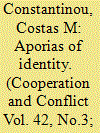

|
|
|
|
|
| Publication |
2007.
|
| Summary/Abstract |
This article examines the predicaments and paradoxes of identity politics in Cyprus. It looks at the historical alliance of colonial practices and nationalist rationales that brought about a static bicommunal system, establishing the basis for inter-ethnic conflict, or what became known as the `Cyprus problem'. The advent of modern governmentality, dividing and classifying the Cypriot population, helped, in addition, to solidify fluid and ambiguous ethno-religious boundaries, making it more difficult for individuals to use ethno-religious identities flexibly and pragmatically, including their use as a tactic to resist the policies of consecutive regimes of power. The article suggests that the 'Cyprus problem' provides a moral alibi for the pursuit of a range of problematic regulations and practices against individuals caught between the dominant ethnic identities, even though there also exist windows of opportunity and resistance on the ground. The article focuses on the genealogy and presence of hybrid communities and syncretistic lifestyles, which complicate and transgress the binary of Greek/Christian versus Turk/Muslim, and the existence of which became progressively abnormalized or exoticized
|
|
|
|
|
|
|
|
|
|
|
|
|
|
|
|
| 2 |
ID:
081207
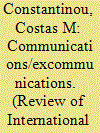

|
|
|
|
|
| Publication |
2008.
|
| Summary/Abstract |
This interview was conducted over the Internet between February and April 2006. Armand Mattelart is Emeritus Professor of Information and Communication Sciences at the University of Paris VIII. From 1962 to 1973 he was Professor of Sociology of Population and Communication at the Catholic University of Chile, Santiago, and United Nations expert in social development. During the Popular Unity period (1970-73), he worked with the Government of President Salvador Allende until the military coup of September 1973, when he was expelled from Chile. Between 1975 and 1982, he taught at the University of Paris VII and Paris VIII, and, between 1983 and 1997, as founding member of the Communications Department at the University of Rennes 2 (Haute-Bretagne). He has carried out numerous research and teaching missions in Africa, Asia, Europe and Latin America. His research interests include communication theory and history, media studies and international communication. He has authored and co-authored numerous books, translated into many languages, including: Advertising International: The Privatization of Public Space (1991); Mapping World Communication: War, Progress, Culture (1994), The Invention of Communication (1996), Networking the World 1794-2000 (2000), The Information Society: An Introduction (2003), and, with Michèle Mattelart, Rethinking Media Theory: Signposts and New Directions (1992); The Carnival of Images: Brazilian Television Fiction (1990) and Theories of Communication: A Short Introduction (1998). His most recent book, published in French, is: La Globalisation de la Surveillance: Aux Origines de l'Ordre Sécuritaire (September 2007
|
|
|
|
|
|
|
|
|
|
|
|
|
|
|
|
| 3 |
ID:
147689
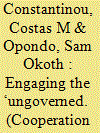

|
|
|
|
|
| Summary/Abstract |
This article explores biopolitical practices that extend beyond national borders and take the whole of humanity as their province. It looks at how attempts to secure and optimize conditions of living in Africa are not merely governmental in scope but also diplomatic in their conceptualization and conduct. It specifically examines the merging of diplomacy, defence and development (or the 3Ds), which purports to optimize life and shape ways of being in areas that cannot be ‘fully governed’ or resist domestication. It assesses the impact of diplomatic pluralization, characterized by the militarization of diplomacy and development, the diplomatization of the military, and new forms of diplomatic outreach, as practised by agencies such as AFRICOM. At stake in this exploration is an ethico-political critique of 3D engagement through which lives, conducts and relationships are negotiated in the postcolony.
|
|
|
|
|
|
|
|
|
|
|
|
|
|
|
|
| 4 |
ID:
081206
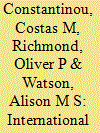

|
|
|
|
|
| Publication |
2008.
|
| Summary/Abstract |
We live in an interconnected, hyper-mediated world. A plethora of communications surrounds our everyday lives and polities, whilst new media and technologies have brought forth possibilities for, and ways of, communicating across space and time. Long-distance communication and travelling, the accelerated flow of information, ideas, images and sounds across national and other frontiers, the construction of multinational urban centres and global media corporations, the live broadcasting and commercialisation of major events and crises, the expansion of global advertising, spin and political marketing, and the advent of the Internet, have modified and complicated the reality of national, international and transnational relationships. This very collection of essays was made possible via the Internet to connect the Editors, based in different locations and while they were travelling. This is now the norm. Slightly more unusually, yet underlining the growing potential of this area, a workshop held at the University of St Andrews in November 2006 brought some of the contributors together both physically and virtually through the medium of Skype. Physical presence has long not been necessary in order to communicate, influence, or indeed, coerce
|
|
|
|
|
|
|
|
|
|
|
|
|
|
|
|
| 5 |
ID:
124773
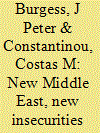

|
|
|
|
|
| Publication |
2013.
|
| Summary/Abstract |
The recent uprisings in the Middle East have highlighted - once again and in dramatic fashion - the confluence of understandings of security, representations of danger and practices of legitimation that shape our variegated geopolitical landscape. The political landscape of the Middle East is changing, and with it many of the rote certainties about how things are done or ought to be done in and with the region. Local regimes of power can no longer justify to national constituencies and international audiences the necessity of autocratic rule, states of emergency and suspension of rights. 'The West' confronts the hypocrisies and moral discounts of its own foreign policy choices, including how its definition of regional security supported the kinds of regimes, policies and human rights violations that Western states traditionally define themselves against.
|
|
|
|
|
|
|
|
|
|
|
|
|
|
|
|
| 6 |
ID:
082635
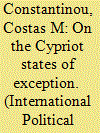

|
|
|
|
|
| Publication |
2008.
|
| Summary/Abstract |
This article explores the politics of exceptionality in Cyprus. It focuses on the postcolonial constriction of Cypriot statehood-the framing of the sovereign itself as an exception-and how the emerging discourse of exceptionality unfolded a spiral of states of exception on the ground. Looking in and across a variety of Cypriot sites and regimes (north, south, sovereign base areas and buffer zone) the article examines what claims of exceptionality legitimate in political and everyday life as well as their ironic and paradoxical effects. Finally, it looks at how the Cyprus case informs debates on current theorizations of exceptionalism
|
|
|
|
|
|
|
|
|
|
|
|
|
|
|
|
| 7 |
ID:
141676
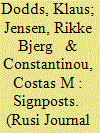

|
|
|
|
|
| Summary/Abstract |
The UK Sovereign Base Areas (SBAs) in Cyprus are products of the terms and conditions attached to Cypriot independence in 1960, and are highly unusual territorial and political entities. Since the 1974 division of the island, the SBAs have co-existed with the Republic of Cyprus, the unilaterally declared Turkish Republic of Northern Cyprus and a UN-administered Buffer Zone. Recent reunification talks between the Greek Cypriots and Turkish Cypriots hold out the promise of change, however. Klaus Dodds, Rikke Bjerg Jensen and Costas M Constantinou explore ‘signposts’ of the changing landscape – both figuratively and literally – that help make sense of the current situation and also illuminate three possible future scenarios facing Cyprus, the UK and its SBAs.
|
|
|
|
|
|
|
|
|
|
|
|
|
|
|
|
| 8 |
ID:
185639
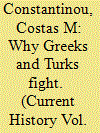

|
|
|
|
|
| Summary/Abstract |
The bicentennial of the Greek Revolution against Ottoman rule is an opportune time to ask why conflict between Greeks and Turks has continued for over two hundred years. Greek and Turkish national narratives reveal deeper reasons for the persistence of mutual belligerence, including common emphasis on national emancipation through violence, perceptions of iniquitous treatment in previous political settlements, and the influence of “banal imperialism” embedded in everyday national symbols. These mindsets continue to fuel disputes over Cyprus and maritime rights.
|
|
|
|
|
|
|
|
|
|
|
|
|
|
|
|
|
|
|
|
|